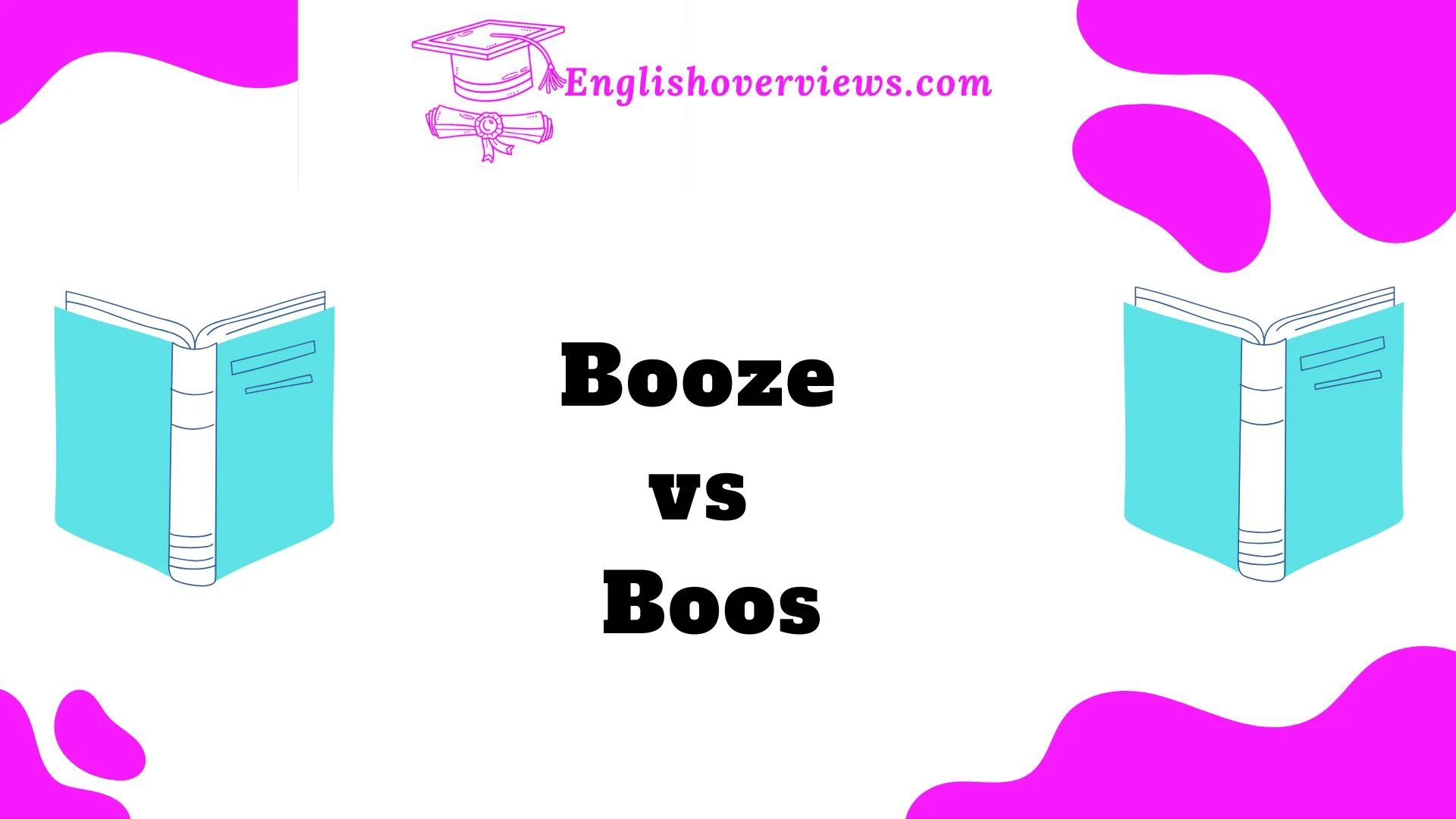Homophones are words that sound the same but have different meanings and spellings. They can trip up even the most experienced English speakers and writers. Two words that often cause confusion are “booze” vs “boos.“ While they may sound identical, they couldn’t be more different in meaning.
In this article, we’ll break down the differences between booze and boos with clear definitions, real-world examples, and practical tips to help you remember them easily. By the end, you’ll confidently use these words in both speech and writing without second-guessing yourself.
We’ll also explore the origins of these words, common mistakes people make, and even test your knowledge with a fun quiz section. So, if you’ve ever been puzzled about whether someone was talking about a drink (booze) or audience reactions (boos), you’re in the right place!
Let’s dive in and unravel the mystery of these tricky homophones.
What Are Homophones?
Homophones are words that sound alike but have different meanings and spellings. These tricky words exist in almost every language, but English seems to have an especially large collection.
Key Characteristics of Homophones:
- Same Pronunciation: They sound identical when spoken.
- Different Meanings: They refer to entirely different things.
- Different Spellings: They are spelled differently, even if subtly.
Examples of Common Homophones:
| Word 1 | Word 2 | Meaning 1 | Meaning 2 |
| There | Their | A location | Belonging to them |
| To | Too | Direction | Also/Excessively |
| Bare | Bear | Uncovered | An animal or to carry |
These examples show how small spelling differences can create huge meaning changes.
Why Homophones Cause Confusion:
- Similar Pronunciation: Even native speakers get confused.
- Context is Key: Without context, it’s hard to tell which word is intended.
- Writing vs. Speaking: In spoken English, homophones are often misinterpreted.
Pro Tip: Always double-check your usage in written communication to avoid embarrassing mix-ups!
Let’s now focus on our main culprits: booze and boos.
What Does ‘Booze’ Mean?
The word “booze” is a slang term for alcoholic beverages. Whether it’s beer, wine, or spirits, “booze” is often used in casual conversations to refer to alcohol.
Definition of Booze:
- Noun: Alcoholic drink, especially when referred to informally.
- Verb: To drink alcohol excessively or in celebration.
Etymology of Booze:
The word “booze” has been around since the 14th century, originating from the Middle Dutch word “būsen”, which means “to drink excessively.” Over time, it evolved into the familiar slang term we know today.
Usage of ‘Booze’ in Sentences:
- “They brought a lot of booze to the party last night.”
- “After a long week, he likes to relax with some booze.”
- “Let’s hit the store and grab some booze for the weekend.”
Facts About Booze:
- The global alcohol market is valued at over $1.5 trillion.
- Excessive booze consumption can lead to health issues like liver damage.
- Booze is deeply tied to cultural and social traditions worldwide.
Quick Table: Formal vs. Informal Usage of Booze
| Formal Term | Informal Term |
| Alcohol | Booze |
| Beverage | Booze |
| Liquor | Booze |
While “booze” works well in casual conversations, it’s best to use “alcohol” in formal writing.
What Does ‘Boos’ Mean?
The word “boos” refers to the sounds of disapproval made by an audience, typically during a performance or speech.
Definition of Boos:
- Noun: Shouted disapproval, typically by an audience.
- Verb: To express disapproval by shouting “boo!”
Etymology of Boos:
The term “boo” comes from Middle English “bo”, a sound used to express disapproval or scare someone. Over time, it evolved into “boos” to represent collective jeering.
Usage of ‘Boos’ in Sentences:
- “The performer received loud boos after forgetting their lines.”
- “Despite the boos, she finished her speech confidently.”
- “The referee’s decision was met with deafening boos from the crowd.”
Interesting Facts About Boos:
- Boos are often louder in sports stadiums than in theaters.
- Some performers use boos as motivation to improve.
- In ancient times, boos and whistles were both signs of disapproval.
Quick Table: Boo as a Noun vs. Verb
| Usage | Example |
| Noun | The boos echoed in the hall. |
| Verb | The crowd booed the comedian off the stage. |
Understanding these contexts helps avoid embarrassing mix-ups.
Key Differences Between ‘Booze’ and ‘Boos’
| Aspect | Booze | Boos |
| Part of Speech | Noun, Verb | Noun, Verb |
| Meaning | Alcoholic drink | Sounds of disapproval |
| Pronunciation | /buːz/ | /buːz/ |
| Context | Informal gatherings | Performances, events |
Memory Trick:
- Think of “booze” as something you might drink at a party.
- Think of “boos” as sounds you’d hear at a bad performance.
Common Mistakes and How to Avoid Them
Typical Errors:
- Writing “The crowd drank boos” instead of “The crowd drank booze.”
- Saying “The boos were tasty” instead of “The booze was tasty.”
Tips to Remember:
- Booze = Alcohol (Remember the “z” as in “buzzed”).
- Boos = Sounds (Remember the “s” for “sound”).
Quick Quiz:
- The crowd erupted in loud ___ after the speech.
- They stocked up on ___ for the party.
Answers:
- Boos
- Booze
In the next section, we’ll dive into real-world examples and answer some frequently asked questions to seal your understanding. Stay tuned! 🚀
FAQs About Booze vs. Boos
1. What is the main difference between booze and boos?
- Booze refers to alcoholic beverages, while boos are sounds of disapproval made by an audience.
2. Can booze be used in formal writing?
- No, booze is considered informal slang. In formal contexts, use words like “alcohol” or “beverage.”
3. How do you pronounce booze and boos?
- Both words are pronounced /buːz/, making context essential to differentiate them.
4. Are there any memory tricks to remember the difference?
- Yes! Think of “booze” as something you’d drink (buzzed after booze) and “boos” as sounds of disapproval (hissing sounds).
5. Can boos ever be positive?
- Rarely. Boos almost always indicate negative reactions in public settings.
6. What are common mistakes with these words?
- Mixing them up in writing, such as saying “The boos were refreshing” instead of “The booze was refreshing.”
7. Is booze used globally?
- Yes, booze is widely recognized in English-speaking countries, though some regions have unique slang for alcohol.
8. Are there synonyms for booze and boos?
- For booze: Alcohol, liquor, spirits.
- For boos: Jeers, heckling, hisses.
9. Can both words be verbs?
- Yes. Booze can mean “to drink alcohol”, and boos can mean “to express disapproval vocally.”
10. What’s the best way to practice these words?
- Use them in sentences daily and pay attention to how they appear in books, movies, or casual conversations.
Conclusion
Understanding the difference between “booze” and “boos” might seem minor, but it’s a perfect example of how homophones can trip us up. These two words sound exactly the same but have completely different meanings and contexts.
- Booze is all about alcoholic drinks and often comes up in casual conversations or informal writing.
- Boos are tied to audience reactions and are typically associated with negative feedback.
By remembering their definitions, studying real-world examples, and using memory tricks, you’ll confidently avoid mix-ups in both writing and speaking.
Language is full of such quirks, and mastering them can significantly improve your communication skills. The next time you hear someone mention booze or boos, you’ll know exactly what they mean!
If you found this article helpful, feel free to share it with others or drop your own examples of tricky homophones in the comments section below.

English Overviews is a resourceful website dedicated to providing valuable content related to grammar and vocabulary. AD has made notable contributions, sharing insights on various subjects, including WordPress themes and plugins. The primary goal of the site is to help users improve their English language skills effectively.











